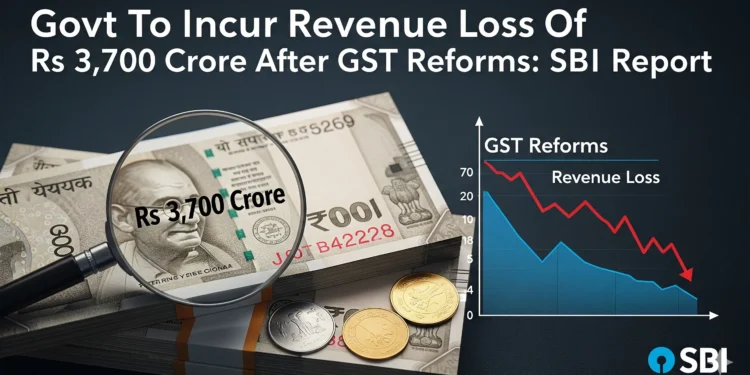According to an SBI report, the proposed GST reforms could result in a ₹3,700 crore revenue shortfall for the government. Learn how these changes may impact the economy, businesses, and future tax structures.

GST Reforms May Lead to ₹3,700 Crore Revenue Loss, Says SBI Report
The proposed Goods and Services Tax (GST) reforms are aimed at improving compliance, streamlining tax processes, and boosting economic efficiency. However, a recent report by the State Bank of India (SBI) warns that these reforms could lead to a revenue loss of ₹3,700 crore for the government. While the reforms are designed to simplify taxation and enhance transparency, concerns are rising over their short-term financial implications and how businesses and consumers might be affected.
What the SBI Report Highlights
The SBI report points out that the revenue loss stems mainly from adjustments in tax rates, exemptions, and compliance structures under the new framework. The government’s intent is to encourage formalization of the economy and ease the tax burden on small and medium enterprises (SMEs). However, this transition is likely to cause temporary revenue gaps, as compliance takes time to stabilize and businesses adjust to the new structure.
Additionally, certain sectors that benefited from existing exemptions may face higher tax liabilities, prompting resistance and slow adoption. On the other hand, sectors that see simplified procedures might experience short-term growth, although this won’t immediately offset the government’s revenue deficit.
Why Is Revenue Loss Expected?
The report outlines several reasons for the anticipated shortfall:
- Lower Tax Rates for Select Sectors – As part of reform, the government may reduce tax rates for key industries to encourage production and consumption, leading to lower collections initially.
- Exemption Rationalization – Some exemptions that benefited specific sectors or products may be removed or rationalized, resulting in disputes and slower implementation.
- Compliance Cost Adjustments – SMEs might receive transitional relief or delayed compliance requirements, which would temporarily reduce tax inflow.
- Supply Chain Realignment – Businesses adjusting to new reporting systems and digital filing processes may face disruptions that reduce taxable transactions in the near term.
How This Affects Businesses
Businesses, particularly SMEs, are at the heart of the reforms. While larger corporations may adapt quickly, smaller firms are expected to face hurdles in implementing new compliance standards. This could lead to reduced operational efficiency in the short term.
However, the long-term benefits include:
- Improved tax transparency
- Greater ease of doing business
- Enhanced interstate commerce
- Better supply chain integration
Startups and smaller businesses may benefit from simplified registration processes and reduced tax rates, but they will require guidance and training to implement the reforms successfully.
What It Means for Consumers
Consumers may see mixed results depending on how reforms are applied:
- Short-Term Price Fluctuations – As businesses adjust, prices on some goods and services may rise temporarily.
- Improved Supply Chains – Over time, faster logistics and seamless interstate trade could lead to better product availability and competitive pricing.
- Increased Compliance Costs Passed Down – Some businesses might pass compliance costs to consumers, though competition could keep prices in check.
Government’s Plan to Address the Shortfall
The government is expected to use a combination of measures to mitigate the revenue loss:
- Improved Digital Monitoring – By enhancing tax tracking systems, leakage can be minimized.
- Broader Tax Base – Bringing informal sectors into the tax net will gradually increase collections.
- Incentives for Timely Compliance – Offering rebates or lower rates for early tax filings could encourage businesses to formalize operations.
Additionally, borrowing strategies and temporary relief packages may be employed to support sectors hardest hit by the transition.
The Road Ahead
While the ₹3,700 crore loss presents an immediate challenge, experts believe that the reforms are essential for creating a more efficient and transparent tax system in India. The long-term benefits, such as better governance, streamlined processes, and an expanded tax base, are expected to outweigh short-term revenue setbacks.
Stakeholders are advised to proactively prepare for compliance changes, seek advisory support, and stay informed about regulatory updates. Businesses that adapt early will likely gain a competitive edge as the economy gradually shifts toward formalization.
READ ALSO…….Canada’s Admission: Khalistani Terror Groups Funded from Within Its Borders 10 Sep















 Categories
Categories









